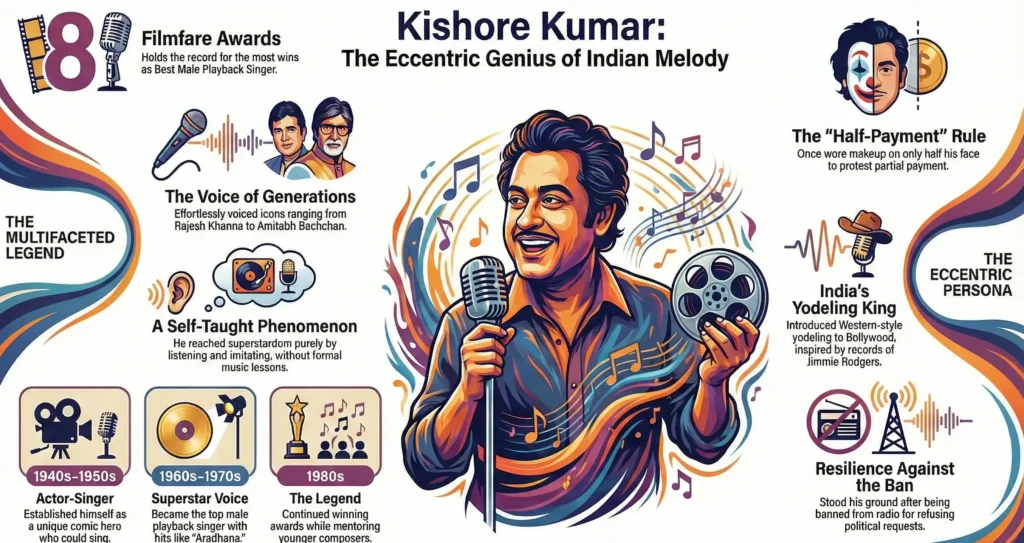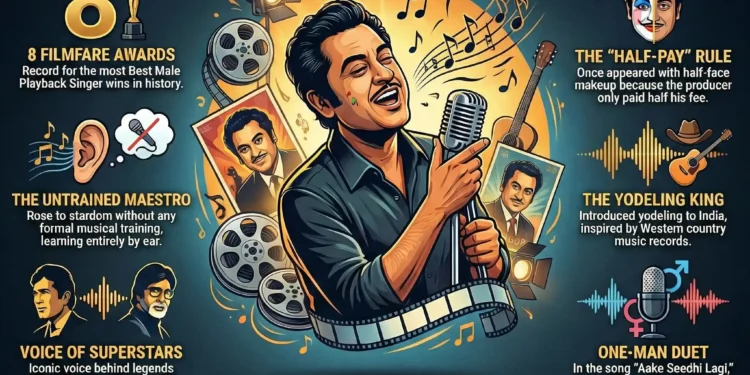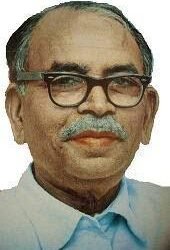Kishore Kumar, born Abhas Kumar Ganguly in 1929, was a legendary Indian playback singer, actor, and composer. Born into a Bengali family in Khandwa, he followed his brother Ashok Kumar into the film industry. Despite having no formal musical training, he rose to become the most successful playback singer in Bollywood history, winning a record 8 Filmfare Awards. Known for his versatility, yodeling style, and eccentric personality, he was the voice behind superstars like Rajesh Khanna and Amitabh Bachchan. His career spanned four decades, leaving behind a legacy of over 2,500 songs that continue to resonate today.| Attribute | Details |
| Full Name | Abhas Kumar Ganguly |
| Screen Name | Kishore Kumar |
| Date of Birth | August 4, 1929 |
| Birthplace | Khandwa, Central Provinces (now Madhya Pradesh) |
| Date of Death | October 13, 1987 |
| Profession | Playback Singer, Actor, Music Director, Lyricist, Producer |
| Debut Film (Acting) | Shikari (1946) |
| Debut Song | “Marne Ki Duayen Kyon Mangu” (Ziddi, 1948) |
| Key Awards | 8 Filmfare Awards for Best Male Playback Singer (Record) |
| Spouse | Ruma Guha Thakurta, Madhubala, Yogeeta Bali, Leena Chandavarkar |
| Notable Songs | “Roop Tera Mastana”, “Mere Sapno Ki Rani”, “Khaike Paan Banaras Wala” |
Early Life: The Boy from Khandwa

Born as Abhas Kumar Ganguly in the historic town of Khandwa, Kishore came from a well-to-do Bengali Brahmin family. His father, Kunjalal Ganguly, was a lawyer, and his mother, Gouri Devi, came from a wealthy background. As the youngest of four siblings, he grew up in the shadow of his elder brother, Ashok Kumar, who was already a star in Bombay. Despite studying at Christian College, Indore, young Kishore’s heart was set on cinema. He spent his childhood imitating the legendary K.L. Saigal, unaware that he would one day carve his own unique path in the industry.
Dr. A.P.J. Abdul Kalam: (1931-2015)
Entry into Entertainment: The Reluctant Actor
Kishore moved to Bombay with the help of his brother but had no formal training in music. He started as a chorus singer at Bombay Talkies. His acting debut came in 1946 with Shikari, but his passion remained singing. In 1948, he got his first break as a playback singer with the song “Marne Ki Duayen Kyon Mangu” for the film Ziddi. However, his early years were filled with rejection. Music directors found his voice too raw and his yodeling style—inspired by Western country music—too eccentric for the traditional sensibilities of the time.
8 Defining Chapters in the Vikram Sarabhai Biography
The Golden Era: The Voice of a Generation
The turning point came in 1969 with the release of Aradhana. When S.D. Burman fell ill, his son R.D. Burman tapped Kishore to sing “Mere Sapno Ki Rani” and “Roop Tera Mastana.” The songs were instant chartbusters, cementing Kishore as the voice of the new superstar, Rajesh Khanna.
- Versatility: He could effortlessly switch from the sombre “Chingari Koi Bhadke” to the energetic “Eena Meena Deeka.”
- The Bachchan Wave: In the 70s, he became the primary voice for Amitabh Bachchan, delivering hits like “Khaike Paan Banaras Wala” and “Pag Ghungroo Baandh.”
- Multifaceted Talent: Beyond singing, he produced, directed, and acted in classic comedies like Chalti Ka Naam Gaadi and Padosan.
Personal Challenges & Resilience
Kishore’s personal life was as dramatic as his movies. He married four times and was known for his eccentric behavior, often putting up “Beware of Kishore” signs at his home. Professionally, he faced a major ban during the Emergency in 1975 for refusing to sing at a government rally. His songs were banned from All India Radio, but he stood his ground, emerging even more popular once the ban was lifted.
6 Unfoldings in the Subrahmanyan Chandrasekhar Biography
Quick Comparison: The Evolution of Kishore
| Phase | Focus | Key Hits | Impact |
| 1940s-50s | Actor-Singer | “Eena Meena Deeka”, “Hum Hain Rahi Pyar Ke” | Established him as a comic hero who could sing. |
| 1960s-70s | The Superstar Voice | “Mere Sapno Ki Rani”, “Pal Pal Dil Ke Paas” | Displaced Mohd. Rafi to become the top male playback singer. |
| 1980s | The Legend | “Agar Tum Na Hote”, “Sagar Kinare” | Continued to win awards and mentor younger composers like Bappi Lahiri. |
Curious Indian Fast Facts
- No Training: Kishore Kumar never received any formal training in music; he learned by listening and imitating.
- The “Half” Payment: He was notorious for stopping recording if he wasn’t paid fully. On one occasion, he appeared on set with makeup on only half his face because the producer had paid only half the fee.
- Yodeling King: He introduced yodeling to Indian cinema, inspired by listening to records of Jimmie Rodgers and Tex Morton at his brother’s house.
- Reverse Singing: In the song “Aake Seedhi Lagi” from Half Ticket, he sang both the male and female parts himself.
- Khandwa Connection: Despite his fame in Mumbai, he always longed to return to his hometown, Khandwa, famously saying, “Doodh jalebi khayenge, Khandwa mein bas jayenge.”
Conclusion
Kishore Kumar was not just a singer; he was a phenomenon. From a reluctant actor who intentionally flubbed lines to avoid being cast, to a singer who defined the romanticism of the 70s, his life was a testament to raw talent and individualism. He proved that you don’t need formal training to touch hearts—you just need soul. Today, his voice remains the soundtrack of Indian emotions, proving that while legends die, their melodies live forever.
10 Remarkable Facts About Meghnad Saha Life and Achievements
If you think you have remembered everything about this topic take this QUIZ
Results
#1. What was Kishore Kumar’s real birth name?
#2. Kishore Kumar holds the record for winning the most Filmfare Awards for Best Male Playback Singer. How many did he win?
#3. Which 1969 film is considered the turning point in his career, featuring hits like “Mere Sapno Ki Rani”?
#4. Kishore Kumar was known for introducing which unique singing style to Indian cinema?
#5. What was a unique aspect of Kishore Kumar’s musical training?
#6. Why were Kishore Kumar’s songs banned from All India Radio during the Emergency in 1975?
#7. In which film did Kishore Kumar sing both the male and female parts for the song “Aake Seedhi Lagi”?
#8. Despite his fame in Mumbai, Kishore Kumar always longed to return to his birthplace, which was:
7 Secrets of Padmanabhaswamy Temple Treasure
What was Kishore Kumar’s real name?
His birth name was Abhas Kumar Ganguly.
How many Filmfare Awards did Kishore Kumar win?
He won 8 Filmfare Awards for Best Male Playback Singer, a record that still stands.
Was Kishore Kumar a trained singer?
No, he had no formal training in music and was entirely self-taught.
Who were Kishore Kumar’s wives?
He was married four times: to Ruma Guha Thakurta, Madhubala, Yogeeta Bali, and Leena Chandavarkar.
Why was Kishore Kumar banned from All India Radio?
He was banned during the Emergency in 1975 because he refused to sing at a government rally organized by Sanjay Gandhi.
Read More: https://curiousindian.in/asha-bhosle-september-1933-present/








